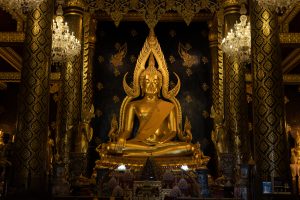Thailand’s new government cannot get enough of “soft power.” It has become such a buzzword in the Kingdom that a Chiang Mai man on X (formerly Twitter) gasped at the extent of its use, mockingly noting, “My [mate’s] daughter won a Thai dancing competition in [Bangkok] and her school called it a soft power competition.” It’s easy to see the appeal of the idea, given the recent appearance of pop superstar Ed Sheeran posing with famed Thai chef Jay Fai and his after-concert visit to a tattoo shop for a traditional Sak Yant tattoo.
But celebrities like Ed Sheeran are passing visitors, and as a matter of practice do not often speak their minds about the other, less appealing aspects of Thai culture. To Sheeran, engaging with local culture and being seen out and about is part and parcel of enhancing his own cultivated British soft power. As much as he brings attention to local attractions, attraction and celebrity also threaten to expose to the world the Thai state’s notorious use of hard power against critics and dissenters.
Within hours of Ed Sheeran’s Thai cultural escapade, two Thai journalists were arrested as “accomplices” to the March 2023 act of a young Thai man, Suttawee Soikham, who spray painted an anarchist symbol and the number 112 with a cross through it on the outer wall of Wat Phra Kaew, a temple inside Bangkok’s Grand Palace. Suttawee was later charged with violating the Cleanliness Act and the Ancient Monuments Act. What was the crime committed by those two Prachatai journalists? Merely covering the actions of that young Khon Kaen protestor. Their charge, where Nutthaphol Meksobhon, the reporter who wrote the story about the incident and Natthapon Phanphongsanon, a freelance photographer, took a video of the incident, is the same, collaborating in vandalizing a historical site, is punishable by up to seven years in prison.
Thailand has been down this road before, but the current reality has been made possible by Thai Prime Minister Srettha Thavisin’s recent silence and the crippling effect of the recent Constitutional Court ruling that equates attempts to reform or repeal Article 112 – Thailand’s lese-majeste law – as treasonous. Thailand could now fall into a junta-era pattern of media self-censorship, where coverage of conventionally taboo topics like the monarchy lead to an internal crackdown, evidenced by a 2020 speech by human rights lawyer and now political prisoner Anon Nampa, who first tested the limits of public speech by discussing the role of the monarchy in current Thai society. This led to Thai media outlets cutting their live coverage of the speech.
These two events, the arrest of the Prachatai journalists and the Constitutional Court decision, add to the massive public dossier of heavy-handed “hard” power tactics that the Thai state has employed since the de facto restoration of the monarchy under Field Marshal Sarit Thanarat in the mid-1950s. No life, no individual rights, and no political expense have been spared in the defense of the Palace and its symbiotic relationship with the military – a fact that exists in high tension with Srettha’s “soft power” pursuit.
When Thailand achieves (and it will) the same cultural soft power that Britain and the United States are fully capable of exporting globally, much of this cultural production will likely arise in response to the repressive tactics of the Thai state, rather than Sheeran’s politically harmless childhood reflections or Taylor Swift’s lambasting of past boyfriends. There is a good chance that the tone of this cultural output will be darker, infused by the structural and physical violence of the Thai state, like the anger reflected in early American “gangsta” rap.
While Srettha has emphasized a more depoliticized form of soft power, with the National Soft Power Committee in January announcing changes in censorship rules, it still forbids discussion of the monarchy. And, in a new, unpredictable environment, it will be difficult for the government to promote the emergence of soft power while completely suppressing vocal dissent.
For instance, former junta leader and Prime Minister Prayut Chan-o-cha was quick to praise rapper Danupa “Milli” Kanaterrakul for her promotion of mango sticky rice at Coachella, but not before he sued her for defamation after she criticized him online. As Thai music becomes more popular, it will soon further irritate and mock the government, undermining Thailand’s international image and reputation. The shame of its past actions is reflected in the lyrics of Rap Against Dictatorship, whose song “prathet ku mee” symbolizes the actions of a brutal 1970s military government, where “The country that its capital’s hearth turned into killing fields / The country that leaders eat taxes like a sweet meal.”
When Thai culture and music transcend the region and become impossible to censor, how long will it be until songs are written about the fates of popular figures like Pita Limjaroenrat, the denial of democracy, and the complicity of Thaksin Shinawatra’s family, who championed Thai democracy only to betray it? If Srettha is successful in boosting Thai cultural soft power, he will inevitably also broadcast Thailand’s continuing legacy of hard power oppression.

































